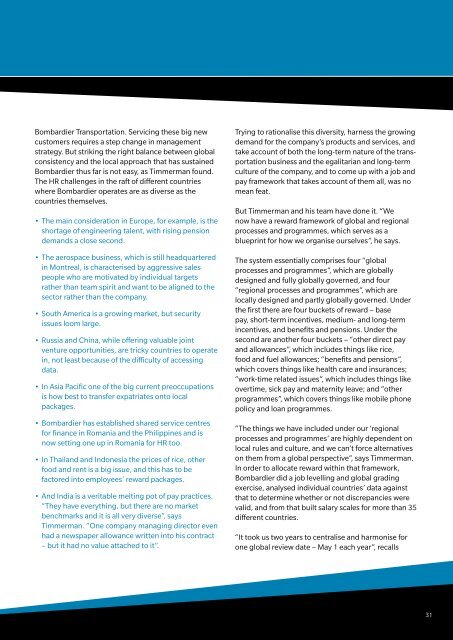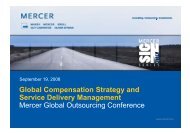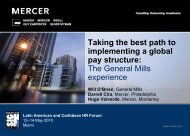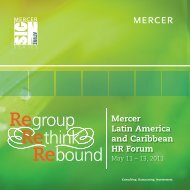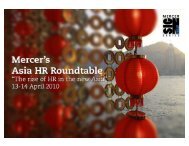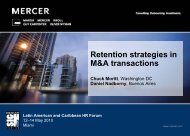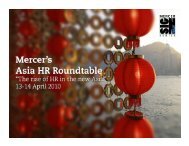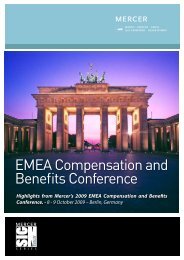A SERIES OF ARTICLES FRoM THE 2011 EMEA CoMPENSATIoN ...
A SERIES OF ARTICLES FRoM THE 2011 EMEA CoMPENSATIoN ...
A SERIES OF ARTICLES FRoM THE 2011 EMEA CoMPENSATIoN ...
You also want an ePaper? Increase the reach of your titles
YUMPU automatically turns print PDFs into web optimized ePapers that Google loves.
Bombardier Transportation. Servicing these big new<br />
customers requires a step change in management<br />
strategy. But striking the right balance between global<br />
consistency and the local approach that has sustained<br />
Bombardier thus far is not easy, as Timmerman found.<br />
The HR challenges in the raft of different countries<br />
where Bombardier operates are as diverse as the<br />
countries themselves.<br />
• The main consideration in Europe, for example, is the<br />
shortage of engineering talent, with rising pension<br />
demands a close second.<br />
• The aerospace business, which is still headquartered<br />
in Montreal, is characterised by aggressive sales<br />
people who are motivated by individual targets<br />
rather than team spirit and want to be aligned to the<br />
sector rather than the company.<br />
• South America is a growing market, but security<br />
issues loom large.<br />
• Russia and China, while offering valuable joint<br />
venture opportunities, are tricky countries to operate<br />
in, not least because of the difficulty of accessing<br />
data.<br />
• In Asia Pacific one of the big current preoccupations<br />
is how best to transfer expatriates onto local<br />
packages.<br />
• Bombardier has established shared service centres<br />
for finance in Romania and the Philippines and is<br />
now setting one up in Romania for HR too.<br />
• In Thailand and Indonesia the prices of rice, other<br />
food and rent is a big issue, and this has to be<br />
factored into employees’ reward packages.<br />
• And India is a veritable melting pot of pay practices.<br />
“They have everything, but there are no market<br />
benchmarks and it is all very diverse”, says<br />
Timmerman. “One company managing director even<br />
had a newspaper allowance written into his contract<br />
– but it had no value attached to it”.<br />
Trying to rationalise this diversity, harness the growing<br />
demand for the company’s products and services, and<br />
take account of both the long-term nature of the transportation<br />
business and the egalitarian and long-term<br />
culture of the company, and to come up with a job and<br />
pay framework that takes account of them all, was no<br />
mean feat.<br />
But Timmerman and his team have done it. “We<br />
now have a reward framework of global and regional<br />
processes and programmes, which serves as a<br />
blueprint for how we organise ourselves”, he says.<br />
The system essentially comprises four “global<br />
processes and programmes”, which are globally<br />
designed and fully globally governed, and four<br />
“regional processes and programmes”, which are<br />
locally designed and partly globally governed. Under<br />
the first there are four buckets of reward – base<br />
pay, short-term incentives, medium- and long-term<br />
incentives, and benefits and pensions. Under the<br />
second are another four buckets – “other direct pay<br />
and allowances”, which includes things like rice,<br />
food and fuel allowances; “benefits and pensions”,<br />
which covers things like health care and insurances;<br />
“work-time related issues”, which includes things like<br />
overtime, sick pay and maternity leave; and “other<br />
programmes”, which covers things like mobile phone<br />
policy and loan programmes.<br />
“The things we have included under our ‘regional<br />
processes and programmes’ are highly dependent on<br />
local rules and culture, and we can’t force alternatives<br />
on them from a global perspective”, says Timmerman.<br />
In order to allocate reward within that framework,<br />
Bombardier did a job levelling and global grading<br />
exercise, analysed individual countries’ data against<br />
that to determine whether or not discrepancies were<br />
valid, and from that built salary scales for more than 35<br />
different countries.<br />
“It took us two years to centralise and harmonise for<br />
one global review date – May 1 each year”, recalls<br />
33 31


